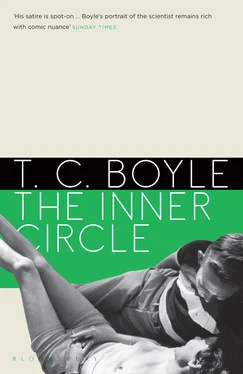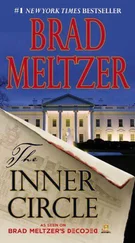Of course, much of what I’ve related here is what I’ve gleaned from my personal knowledge of the man — we’ve been colleagues for fourteen years now and certainly we’ve kept no secrets from each other — and yet the basic information was there in the files when on that December morning a week before the uncertain Christmas of 1941 I violated Prok’s proscription for the second (but not the last) time. I can remember sitting there among the dried-out galls, my heart racing as I scanned the file of my prospective colleague, “Hark the Herald Angels Sing” banging around in my head, the fading tramp of students’ feet trailing down the corridor. How could I ever hope to match him? — that was what I was thinking. I was sure suddenly that I’d been fooling myself all along, that Iris had been right — Corcoran was here to displace me, here to take my desk and my salary and my interviews, to unseat me in the hierarchy of the project I’d been the first to sign on for. A kind of panic took hold of me and I had to get up and pace round the room to calm myself. I made a mental list of my own virtues — loyalty, affability, a knowledge of the research second only to Prok’s, my seniority on the job — and yet, no matter how I turned it over in my mind, I had to admit that Corcoran was my superior in every way, at least on paper: eight years older, the father of two, holder of an advanced degree and so high a rater he’d wind up at the top of any number of our graphs and charts. Guilty now — self-accused and suddenly ashamed — I slipped the file back in the cabinet and turned the key in the lock.
We took possession of the apartment on New Year’s Day. It was far from ideal — ten footsore blocks from campus in what must have been the shabbiest neighborhood in Bloomington and damp as a tomb because it was situated at the bottom of a hill on land reclaimed from a marsh, three rooms with a bath and a perdurable smell of the old lady who’d died there (Mrs. Lorber’s elder sister, if that tells you anything of its provenance) — but it was ours, and Iris, with her genius for interior design, soon transformed the place. She strung a bead curtain to separate the kitchen from the sitting room, stripped the faded Victorian wallpaper and replaced it with an almost austere modern design in beige with an overlay of gray-and-white interlocking rectangles, then, after deliberating all of one afternoon and into the evening when I got home from work, directed me in hanging the four framed woodcuts depicting scenes from Wuthering Heights she’d found in the back corner of a secondhand shop. Our sofa and armchair came courtesy of the want ads in the back of the paper, and Prok was kind enough to lend us the Nash to serve as moving van and Ezra helped me maneuver the things through the narrow front door. There was the bed — a double, made of painted iron and dug out of an antiques shop at a basement-bargain price — and the mattress, marked “just like new,” to fit it, a bookcase to lend stateliness to the barren wall across from the sofa, my radio, an assortment of blue glass vases featuring various arrangements of dried flowers and an aspidistra Mac gave us, along with a set of pots and saucepans, as a wedding present. And Prok had been more than generous too, with a Christmas bonus that came at just the right time and the promise of a five-dollar raise to fifty dollars a week beginning the first of the year.
We had sandwiches out of a brown paper sack that first night, sitting cross-legged on the mattress we laid out on the floor because we were too exhausted to set up the bed, and we passed a quart of beer back and forth till it was gone, and then we opened another. I had the radio on — Benny Goodman playing “Don’t Be That Way,” or maybe it was something softer, sweeter — and I lay back against the soon-to-be-stripped wall with Iris in my arms and just held her. The smell of her hair, newly washed in our very own bathroom sink, was the smell of a new beginning, the beginning of life on our own, adult life, together and inseparable. I can’t describe the peace I felt that night. We must have lain there on our new mattress, admiring our new walls, our new front door and the new bead curtains till past midnight, the beer setting us gently adrift, the music swaying softly beneath it, borne up on its own currents. Mrs. Lorber and the various RAs were no longer a part of our universe. Ezra could bathe or not as he pleased and it was nothing to me. The backseat of the Nash was a thing of the past. We had our own place now — our own home — and we could do anything we wanted, anytime, day or night, and never have to worry about the headlights of another car pulling up behind us or the fumes from the exhaust or the night that lay round us like hostile territory.
When I came in from work the next day, Iris had her hair up in a kerchief and she was wearing an apron. The apartment smelled powerfully of something other than Mrs. Lorber’s deceased sister and the ineradicable ribbons of black mold that traced the lines of the fixtures she’d left behind. “What is that, Iris?” I asked, swishing through the bead curtains. “It smells, well, good — or different.”
The kitchen table, layered with coats of ancient kelly-green paint and unstable on its legs, was a scene of devastation. Every plate we owned — used plates, chipped variously round the edges, a legacy of my mother and the trove of our basement in Michigan City — was either crusted with or dripping something. There was a scattering of flour, eggshells, sugar, mounds of potato and apple peelings, what looked to be ketchup and Worcestershire, and spices — marjoram figured prominently in the display, as I recall.
She gave me her smile, two arms conjoined round my neck, and a kiss. “Meat loaf,” she said, “with scalloped potatoes, string beans and apple pan dowdy. The meat loaf and potatoes come courtesy of my mother, and yes, I was standing right beside her in the kitchen all those years in high school, learning how to be a good little housekeeper, thank you very much.” She was grinning, pleased with herself, and so what if the place was a mess — we’d just moved in and she was cooking for me. “As for the apple pan dowdy, I found a recipe in a magazine at the library, and I didn’t have a pencil so I tore it out.” And there it was, a square of glossy paper, Scotch-taped to the cabinet over the stove.
I must have given her a look (she knew full well that as a former librarian I would disapprove of her defacing library materials of any kind, even ephemera like magazines), because she added, “Don’t pout, John. The IU library isn’t going to miss one little recipe — or do you think all the coeds are lined up at the checkout desk right now, sobbing over the apple pan dowdy that might have been?”
Inside the pocket of my overcoat, which I hadn’t yet removed, was a bottle of bourbon. I thought this might be an auspicious time to draw it out and set it amid the clutter on the table. “A little celebration,” I said, lifting two glasses down from the shelf and pouring us each a drink. “To you,” I said, and we clinked glasses even as she corrected me: “To us!”
Can I say that that meal was the best I’ve ever had? Because it isn’t just the quality of the ingredients or the expertise of the preparation or the elegance of the surroundings that make for a great meal, but the mood of the diner — in this case a mood elevated by the situation, by the bourbon, by love —that can make every bite seem as sensual as a kiss. Apple pan dowdy. Meat loaf. I ate like a man who’d been shipwrecked for a month, ate till I could eat no more, then killed the bottle of bourbon — it was a fifth and it got both of us pretty giddy, I’m afraid — and fell on my wife like that same shipwrecked sailor, or maybe his admiral.
Читать дальше












